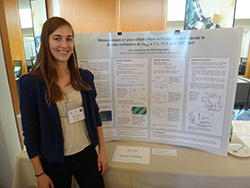North Park Senior Presents Summer Research at Physics Conference

Olivia Chisman's research recreates the conditions of the early universe to try and explain the world around us
CHICAGO (January 19, 2015) — Olivia Chisman spent the summer watching millions of tiny particles moving close to the speed of light crash into one another. It was part of a research program at UCLA, where she joined nearly 500 physicists from around the world in observing the outcomes of a particle accelerator that spans 2.4 miles underground.
“I got to be part of weekly phone meetings with expert physicists and present my research,” said Chisman, a senior in ºÚÁϳԹϒs . “The work is known as fundamental physics. By recreating the conditions of the early universe a few microseconds after the Big Bang, we can try to understand what makes up the world around us.”
Chisman was invited to present her research this past weekend at the , hosted at Purdue University. The goal of the conference was to support women physicists as they transition from a major to a career, and help combat the recent decline of women in the field. After a four-decade trend since 1965 that saw the percentage of women in physics rise from 5 to nearly 25 percent, that number has regressed to below 20 percent, . Joining Chisman, who also presented her research to an American Physical Society Division of Nuclear Physics meeting this fall in Hawaii, were three additional students from North Park’s physics and programs, Anika Zima, Azra Dizdarevic, and Nayelii Duran.
"Research experiences for undergraduates and giving papers at national conferences are incredible opportunities for our students," said , assistant professor of physics at ºÚÁϳԹÏ. "The American Physical Society conference allows the students to make connections with well-known physicists from around the country. It also let’s them meet other young women who are sharing their same experiences and worries about their future. It helps knowing that you are not the only one."
Chisman's research, explained in the above video, included observation of the Relativistic Heavy Ion Collider in Upton, New York.
Like a number of students, Chisman did not take a direct route to a career in physics. “Since I was young I wanted to be a nurse, and I came to North Park as a ,” Chisman said. During her sophomore year, she read some books and watched a few movies about cosmology and astrophysics, and then decided to have a conversation with McDonald. “I asked her what I could do with a physics career,” Chisman said. “She told me my options were limitless.”
Chisman recently submitted applications for a PhD in physics, and hopes to begin a program after her graduation from North Park this May. She is looking to continue the research she began last summer in the field of relativistic heavy ion physics and experimental nuclear physics. Chisman credits North Park’s science programs for preparing her for graduate school and beyond.
“The small class sizes and the way that ºÚÁÏ³Ô¹Ï teaches physics forces students to take responsibility for their own learning, which is something that was infinitely important to my research this summer,” Chisman said. “I’ve been able to have direct contact with my professors, and as a result, they know me very well.”
McDonald is also excited to hear about Chisman's next steps in terms of education and research. "One of my joys is when alumni come back and tell me all about the things they are doing," McDonald said. "I know that ºÚÁÏ³Ô¹Ï makes a difference in the world, and it is great to see it in action with people like Olivia."
Use @npunews to . Learn more

